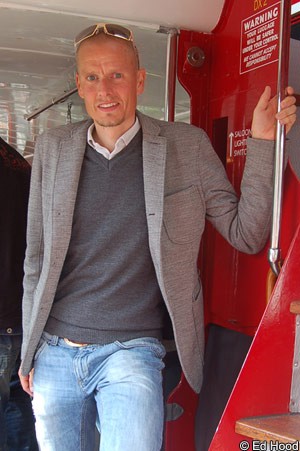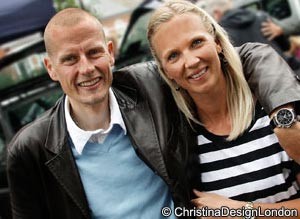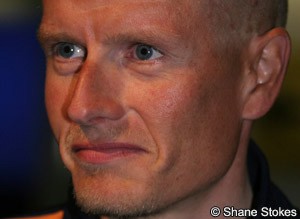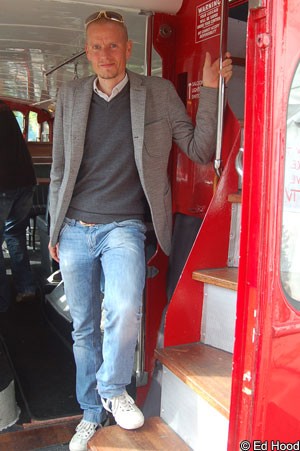Danish climber speaks on racing, controversies and developing his team
 If you were born in the 50’s then you can remember where you were when President Kennedy was assassinated.
If you were born in the 50’s then you can remember where you were when President Kennedy was assassinated.
If you’re a cycling journo then you can remember where you were when Rabobank dumped their yellow jersey-clad team leader Michael Rasmussen off the Tour de France.
It was July 25th 2007; the Dane had just won stage 16 atop the Col d’Aubisque and, with four stages to go, was virtually assured of victory.
His climbing credentials were flawless – he’d won the polka dot jersey in 2005 and 2006 and had a buffer of three minutes on second placed Alberto Contador for the 55 kilometre time trial around Cognac.
But it was not to be; my colleague Martin Williamson and I sat stunned in a pizza bar in the amusement-arcade-on-acid which is late-night Lourdes, in a state of shock as our Blackberrys told us by email, text and ‘net the numbing truth that Rasmussen had allegedly lied about his whereabouts and had been withdrawn from the race by his team.
The Dane had claimed he was training in Mexico in June but had in fact been in the Dolomites at the time.
Former professional and now TV pundit Davide Cassani had spotted the slim climber hard at work in the mountains of Northern Italy in June and mentioned it on screen.
This revelation broke the dam and the Danish Federation’s Jesper Worre waded in with the news that Rasmussen had missed dope tests and was no longer allowed to compete for Denmark at the Worlds or Olympics.
Rasmussen subsequently received a two year ban but sued Rabobank on the grounds that they knew full well where he was, won the case and received 665,000 Euros in compensation.
The man they nicknamed ‘the Chicken’ has been in the sport a long time – he won the Danish junior cross country mountain bike championship in 1992, by 1996 he was national senior champion at the discipline and by 1999 he was champion of the world.
He rode stagiaire for CSC in 2001, went full pro with them the following year before five years with Rabobank and ultimate Armageddon when the sport’s biggest prize was within his grasp.
There has been a lot of turmoil in Rasmussen’s life since that crazy night in France.
After the ban he rode for Mexican Team Tecos Trek, winning a stage in the Vuelta a Chihuahua in 2009. He signed with Italian Continental squad Miche Silver Cross for 2010 but most of the season was lost to illness.
 In the winter of 2010 the Danish watch designer Christina Hembo (left) offered to pay Rasmussen’s salary with a ProTour team for two years.
In the winter of 2010 the Danish watch designer Christina Hembo (left) offered to pay Rasmussen’s salary with a ProTour team for two years.
Bjarne Riis and Saxo Bank were keen and close to signing the slim man from Tollose for the Tour but ‘the UCI, ASO, whoever’ as Rasmussen himself names his detractors ‘had a word’ with the team and no pens were ever put to paper.
Instead Hembo backed Rasmussen to launch Continental team Christina Watches – Onfone.
The 15 man squad includes Danish six day specialist Marc Hester and Italian 2010 Paris-Tours runner up and Vuelta, Tour of Poland and Dauphine stage winner Angelo Furlan.
Rasmussen concedes that his Grand Tour days are done but has set himself the goal of managing his Christina team in the Tour de France within the next few seasons.
VeloNation caught up with Rasmussen after the recent Worlds Championships in Copenhagen.
VeloNation: Which performances by the team are you happiest with, Michael?
Michael Rasmussen: I’m particularly happy with the performances of Angelo Furlan (who has picked up seven wins in 2011) – he’s a good guy to have on a team, not just on a sporting level but as a human being – he’s very well liked and respected in the peloton.
He has a lot of experience which he’s eager to share with the young riders on the team.
VN: I believe that you have your 2012 and 2013 sponsorships in place?
MR: I’m very, very happy with the way things are going as regards sponsors; I can’t say for sure yet but we hope to go Pro Continental in 2013 – next year is another for us to learn the ropes.
I tend to concentrate on the technical sponsors – helmets, shoes, bikes and clothing.
I live in Verona and have built up a lot of good connections in the industry.
As far as other sponsorships go, we have some very competent people working on that in Denmark – the fact that we have sponsorships in place for the next two years means that we have tranquillity in search of our long term goals.
VN: What’s your take on the ‘cycling teams as rich man’s indulgence?’
MR: It certainly makes the teams much more vulnerable if they are based on philanthropy; especially if the individual gets tired of it because the team didn’t achieve a result in the Tour or whatever other race.
It’s better if there’s a team of individuals behind it planning for the future, thinking carefully about the finances – historically the optimum period of time for a team to run is five to seven years before it reaches saturation with the public and media.
VN: In this climate you must get approached by many riders?
MR: We have a fairly long list of riders looking for a position, yes.
But our team is Danish, we’re based in Denmark and it’s our main focus – even though we’ve ridden 40 days abroad in 2011.
Logistically it’s easier for us if the riders are Danish.
But we realise that if we want to move up the rankings then we may have to recruit more foreign riders.
VN: Do you still have the motivation to train as hard as you used to?
 MR: Yes I do – but I just don’t have the time. This year I’ve done perhaps 80% of the training I would usually do – but I’m still competitive at the level I’m racing at.
MR: Yes I do – but I just don’t have the time. This year I’ve done perhaps 80% of the training I would usually do – but I’m still competitive at the level I’m racing at.
Of course if I was still targeting Grand Tours and the Worlds than I’d be at 100%.
These days I have two or three jobs; I could do with a 10 day week – but that’s just the way it is.
If I win a stage in the Tour of Serbia (which he did, this year) it doesn’t actually change much for me – but if I build the team for the future . . .
VN: How many more seasons do you plan to race?
MR: This year I’ve been racing against Davide Rebellin, I’m 37 and he’s 40, so that’s good for the motivation.
As you know, in cycling it’s not the legs which go, it’s the head which goes first – but I still have good motivation. I think I can go on for another two or three years…but I plan to take it just one year at a time.
VN: Why did you decide to start your own team?
MR: I’ve been riding a bike for four decades and I’ve been the best in the world at two different disciplines so I think I know how to race and how to be successful – and I still have great passion for the sport.
I want to pass that knowledge on to others and see the team succeed.
VN: Will the team’s programme expand for 2011?
MR: The UCI calendar was only released on Monday and we are sending out applications but already we are accepted for the Tour of San Luis in Argentina in January. I have ridden the race before and have a good relationship with the Argentineans.
VN: You live in Italy and travel extensively; do you still consider yourself Danish, or are you a European?
MR: My wife is Mexican and my son speaks four languages, so I guess I’m a little bit of both.
I really like Mexico and Italy but I will always be Danish.
VN: Since you came back, how has your level of acceptance among the directeurs sportifs and managers been?
 MR: It’s been good, I haven’t noticed anything else – so you have to think that there was something else behind the teams which showed interest in me but didn’t take it any further.
MR: It’s been good, I haven’t noticed anything else – so you have to think that there was something else behind the teams which showed interest in me but didn’t take it any further.
VN: What’s your proudest moment in the sport?
MR: July 25th 2007 when I won on the Col d’Aubisque. No matter what happened after that, I proved that I was the best climber in the world.
VN: How do you feel when you see Richard Virenque back as part of the Tour?
MR: He deserves to be there, just as well as everybody else who have served their sentences deserve to be there – like Vino, Basso, Brochard and myself.
VN: What would you change about pro cycling?
MR: I’d make the rules simpler, equal for every country – Spain, Denmark, Britain, wherever.
In particular the anti-doping. At the moment it’s managed by each individual country, there should be one standard which applies.
VN: What advice would you give a young rider coming in to the sport?
MR: That’s a difficult one – you need patience, things don’t happen overnight, it’s still a conservative sport in many ways.
Changes take time; and get yourself a reliable manager.
VN: Any regrets?
MR: That I didn’t take Mexican citizenship in 2005…that would have avoided so much shit.
The Danish Federation seems to take a pride in breaching confidentiality.
If I had been born in Italy I’d probably never have ridden the mountain bike and would have turned pro at 21, not 27 – but then I wouldn’t have won the mountain bike Worlds, ridden the Olympics and travelled the world as I did.
So no, I can’t have any regrets about my career.